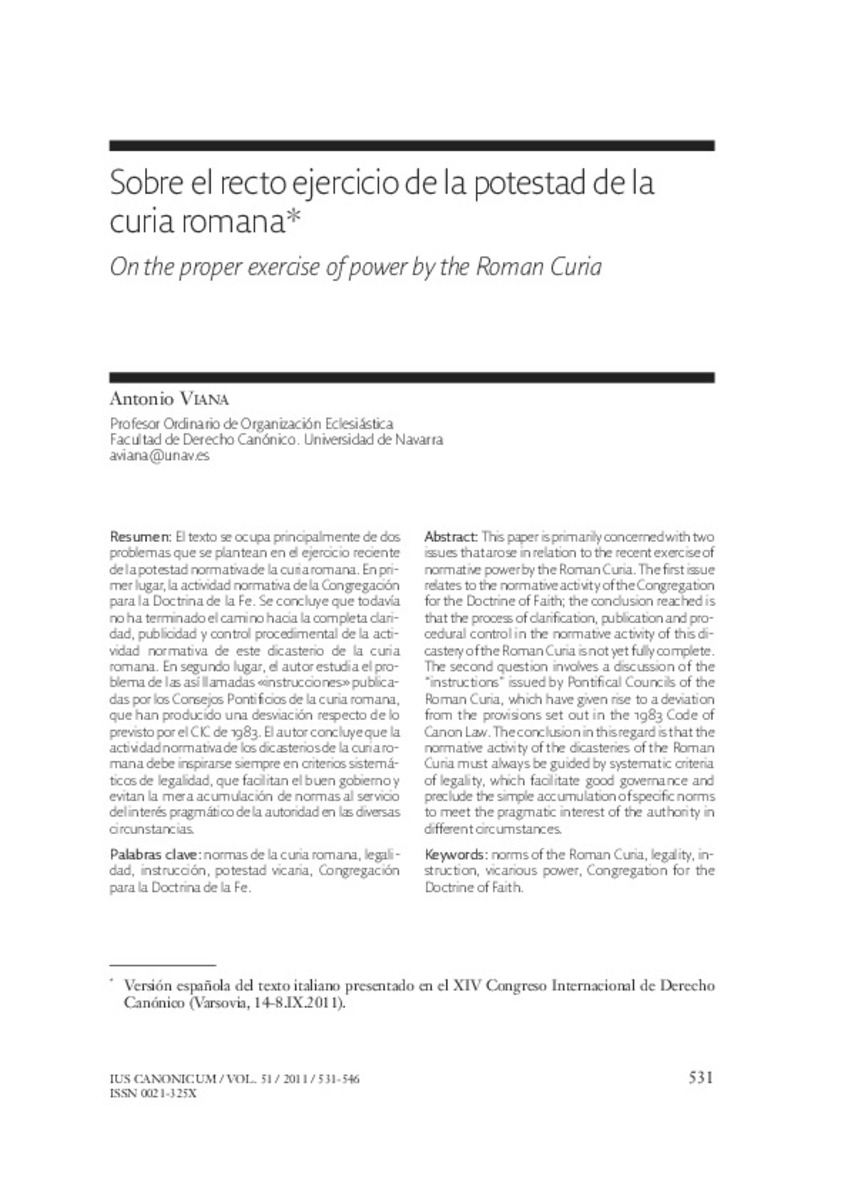Full metadata record
| DC Field | Value | Language |
|---|---|---|
| dc.creator | Viana, A. (Antonio) | - |
| dc.date.accessioned | 2014-12-19T08:35:32Z | - |
| dc.date.available | 2014-12-19T08:35:32Z | - |
| dc.date.issued | 2011 | - |
| dc.identifier.citation | IUS CANONICUM, 2011, 51, N. 102, págs. 531-545. | es_ES |
| dc.identifier.issn | 0021-325X | - |
| dc.identifier.uri | https://hdl.handle.net/10171/37188 | - |
| dc.description.abstract | El texto se ocupa principalmente de dos problemas que se plantean en el ejercicio reciente de la potestad normativa de la curia romana. En primer lugar, la actividad normativa de la Congregación para la Doctrina de la Fe. Se concluye que todavía no ha terminado el camino hacia la completa claridad, publicidad y control procedimental de la actividad normativa de este dicasterio de la curia romana. En segundo lugar, el autor estudia el pro- blema de las así llamadas «instrucciones» publicadas por los Consejos Pontificios de la curia romana, que han producido una desviación respecto de lo previsto por el CIC de 1983. El autor concluye que la actividad normativa de los dicasterios de la curia romana debe inspirarse siempre en criterios sistemáticos de legalidad, que facilitan el buen gobierno y evitan la mera acumulación de normas al servicio del interés pragmático de la autoridad en las diversas circunstancias. | es_ES |
| dc.description.abstract | This paper is primarily concerned with two issues that arose in relation to the recent exercise of normative power by the Roman Curia. The first issue relates to the normative activity of the Congregation for the Doctrine of Faith; the conclusion reached is that the process of clarification, publication and procedural control in the normative activity of this dicastery of the Roman Curia is not yet fully complete. The second question involves a discussion of the “instructions” issued by Pontifical Councils of the Roman Curia, which have given rise to a deviation from the provisions set out in the 1983 Code of Canon Law. The conclusion in this regard is that the normative activity of the dicasteries of the Roman Curia must always be guided by systematic criteria of legality, which facilitate good governance and preclude the simple accumulation of specific norms to meet the pragmatic interest of the authority in different circumstances. | es_ES |
| dc.language.iso | spa | es_ES |
| dc.publisher | Servicio de Publicaciones de la Universidad de Navarra | es_ES |
| dc.rights | info:eu-repo/semantics/openAccess | es_ES |
| dc.subject | Normas de la curia romana | es_ES |
| dc.subject | Legalidad | es_ES |
| dc.subject | Instrucción | es_ES |
| dc.subject | Potestad vicaria | es_ES |
| dc.subject | Congregación para la doctrina de la Fe | es_ES |
| dc.subject | Norms of the Roman Curia | es_ES |
| dc.subject | Legality | es_ES |
| dc.subject | Instruction | es_ES |
| dc.subject | Vicarious power | es_ES |
| dc.subject | Congregation for the Doctrine of Faith | es_ES |
| dc.subject | Materias Investigacion::Derecho canónico | es_ES |
| dc.title | Sobre el recto ejercicio de la potestad de la curia romana | es_ES |
| dc.title.alternative | On the proper exercise of power by the Roman Curia | es_ES |
| dc.type | info:eu-repo/semantics/article | es_ES |
| dc.identifier.doi | 10.15581/016.51.2572 | es_ES |
Files in This Item:
Statistics and impact
Items in Dadun are protected by copyright, with all rights reserved, unless otherwise indicated.






